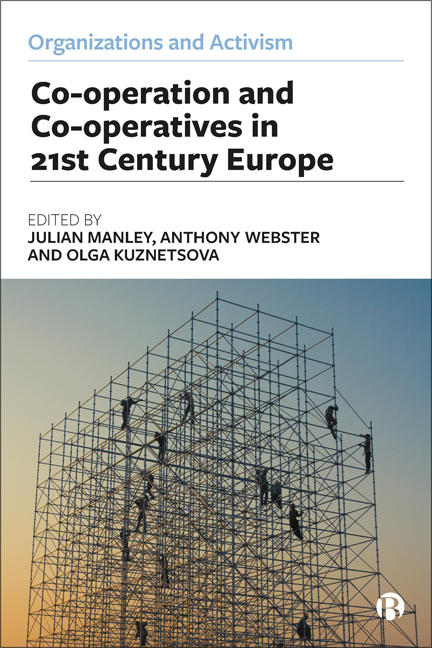Book contents
- Frontmatter
- Dedication
- Contents
- Series Editors’ Preface
- List of Figures and Tables
- List of Abbreviations
- Notes on the Contributors
- Acknowledgements
- Foreword
- 1 Introduction: European Co-operativism in a Changing World
- PART I Seeds: Identifying the Space for Co-operatives in Addressing Social Challenges
- PART II Bridges: Co-operative Culture and Education
- PART III Growth: The Preston Model, Co-operation and Community Wealth Building
- Index
3 - Beyond Green-Washing: Sustainable Development and Environmental Accountability through Co-operators’ Eyes (A French Perspective)
Published online by Cambridge University Press: 28 March 2024
- Frontmatter
- Dedication
- Contents
- Series Editors’ Preface
- List of Figures and Tables
- List of Abbreviations
- Notes on the Contributors
- Acknowledgements
- Foreword
- 1 Introduction: European Co-operativism in a Changing World
- PART I Seeds: Identifying the Space for Co-operatives in Addressing Social Challenges
- PART II Bridges: Co-operative Culture and Education
- PART III Growth: The Preston Model, Co-operation and Community Wealth Building
- Index
Summary
Introduction
This chapter explores the processing of environmental issues by democratically run organizations from the perspective of their members, be they active or retired, founding or new. It is specifically based upon a qualitative analysis of three French workers’ co-operatives from different backgrounds, operating in different sectors and of different sizes. A survey was carried out comprising of 16 individual, face-to-face interviews with members of all co-operatives playing various roles and fulfilling various functions within them. Questionnaires submitted to the interviewees were split into two parts: part 1 was made up of around 15 open questions – some of which were adapted to fit the peculiar history and socio-economic profile of the coop – to better understand the raison d’être of the organization and its members’ understanding of their missions; part 2 was a series of a dozen scaled-response questions to assess the co-operators’ political attitudes and personal stance regarding industrial democracy, ecology and the market economy. Each interview lasted two hours on average but time was unfortunately lacking to consider completing this work with field, let alone participatory, research.
This chapter also draws heavily upon an in-depth knowledge of workers’ co-operation and industrial democracy built up by the author over the last four years of academic research and a fairly regular record of the co-operatives’ activities during the same time span. The study suggests that, while a democratic structure alone might not be a determining or sufficient factor to promote and apply ambitious green reforms within a company, direct participation in collective decision-making enhances and strengthens members’ political consciousness and broadens their areas of concern through a process of collective empowerment and sharing of this political power. This political ‘awakening’ is likely to be even more acutely experienced in the presence of direct adversity. It will also most probably be efficiently maintained and nurtured by an unremitting horizontal questioning, both internally (of the daily working organization) and externally (relating to the social and political environment) oriented.
The impact of democratic decision-making in producers’ co-operatives has already been discussed in an extensive literature, especially in the late 20th century. Most of this focused on the quite narrow economic question of productivity, though (Stephen, 1982; Defourney et al, 1985; Grunberg, 1986; Estrin et al, 1987).
- Type
- Chapter
- Information
- Publisher: Bristol University PressPrint publication year: 2023

